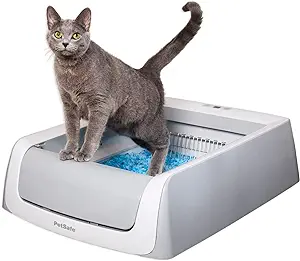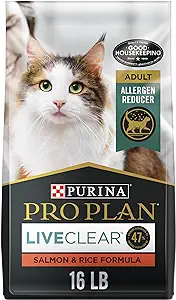This “10 Cat Health Problems and How to Prevent Them” post may contain affiliate links, which means I’ll receive a commission if you purchase through my link, at NO EXTRA COST TO YOU
10 Cat Health Problems and How to Prevent Them
Cats, those mysterious and elegant creatures, often mask their discomfort and ailments, making it challenging for pet owners to recognize when something is wrong. Understanding common health issues in cats and knowing how to prevent them can significantly improve your feline friend’s quality of life. In this detailed guide, we’ll explore prevalent health problems in cats, their symptoms, and effective prevention strategies.

YOU CAN ALSO CHECK :
Mastering the Art of Cat Training: Tips and Tricks for a Happy Feline
Top 5 Automatic Cat Litter Boxes: The Best Picks for Effortless Cleaning
The Ultimate Guide to Pet Vacuums and Grooming Kits: Keep Your Home and Pets Clean and Happy
Top 10 Best-Selling Automatic Cat Feeders on Amazon: Reviews, Pros & Cons
1. Obesity
Overview: Obesity is a growing concern among domestic cats. Excess weight can lead to numerous health issues, including diabetes, arthritis, and heart disease.
Symptoms:
- Noticeable weight gain
- Difficulty grooming
- Decreased activity levels
- Difficulty jumping or climbing
Prevention:
- Balanced Diet: Feed your cat a nutritionally balanced diet appropriate for their age, size, and activity level. Avoid free-feeding and adhere to recommended portion sizes.
- Regular Exercise: Engage your cat in interactive play sessions. Use toys like feather wands, laser pointers, and puzzle feeders to encourage movement.
- Routine Vet Visits: Schedule regular veterinary check-ups to monitor your cat’s weight and overall health.
2. Dental Disease
Overview: Dental disease, including gingivitis and periodontal disease, is common in cats and can lead to severe pain and tooth loss if left untreated.
Symptoms:
- Bad breath
- Difficulty eating or chewing
- Red or swollen gums
- Tooth discoloration
Prevention:
- Regular Brushing: Brush your cat’s teeth regularly using a toothbrush and toothpaste specifically designed for pets.
- Dental Treats: Offer dental treats or toys designed to help clean teeth and reduce tartar buildup.
- Vet Check-ups: Have your cat’s teeth examined during routine veterinary visits and consider professional dental cleanings as recommended.
3. Urinary Tract Infections (UTIs)
Overview: UTIs and urinary issues, such as feline lower urinary tract disease (FLUTD), are relatively common and can be distressing for cats.
Symptoms:
- Frequent urination
- Painful urination (crying out or straining)
- Blood in urine
- Litter box avoidance
Prevention:
- Hydration: Ensure your cat has constant access to fresh water. Consider a water fountain to encourage drinking.
- Diet: Feed a diet formulated to promote urinary health and prevent the formation of urinary crystals or stones.
- Litter Box Maintenance: Keep the litter box clean and accessible. Ensure you have enough litter boxes (one per cat plus one extra) in multi-cat households.
4. Fleas and Parasites
Overview: Fleas and other parasites like ticks and worms can cause a range of health issues, including skin infections and anemia.
Symptoms:
- Excessive scratching or grooming
- Hair loss
- Visible fleas or flea dirt (tiny black specks) in the fur
- Weight loss or lethargy
Prevention:
- Regular Treatments: Use veterinarian-recommended flea and tick prevention treatments.
- Clean Environment: Regularly vacuum and clean your cat’s bedding and living areas.
- Outdoor Supervision: Limit outdoor access or monitor your cat closely if they go outside to reduce exposure to parasites.
5. Diabetes
Overview: Diabetes is a serious condition where the cat’s body cannot regulate blood sugar levels properly. It can lead to a range of health problems if not managed.
Symptoms:
- Increased thirst and urination
- Weight loss despite increased appetite
- Lethargy
- Unkempt coat
Prevention:
- Maintain a Healthy Weight: Prevent obesity by managing your cat’s diet and ensuring regular exercise.
- Balanced Diet: Feed a balanced diet with appropriate levels of carbohydrates and proteins. Consult your vet for specific dietary recommendations.
- Regular Vet Visits: Regular check-ups can help detect early signs of diabetes and other health issues.
6. Kidney Disease
Overview: Chronic kidney disease (CKD) is common in older cats and can progressively worsen if not managed properly.
Symptoms:
- Increased thirst and urination
- Loss of appetite
- Vomiting
- Weight loss
Prevention:
- Hydration: Ensure your cat drinks plenty of water. Wet food can also help increase fluid intake.
- Regular Vet Check-ups: Routine blood and urine tests can help detect kidney issues early.
- Balanced Diet: Feed a diet formulated to support kidney health, particularly if your cat is at risk or has early-stage kidney disease.
7. Upper Respiratory Infections
Overview: Upper respiratory infections (URIs) are common in cats and can be caused by various viruses and bacteria.
Symptoms:
- Sneezing
- Runny nose
- Coughing
- Watery eyes
Prevention:
- Vaccinations: Ensure your cat is up-to-date on vaccinations, including those for common respiratory pathogens.
- Clean Environment: Maintain a clean and stress-free environment to support your cat’s immune system.
- Good Hygiene: Wash hands and avoid close contact with sick cats to prevent the spread of infection.
8. Allergies
Overview: Cats can suffer from allergies to food, environmental factors, or parasites. Allergies can lead to itchy skin and other symptoms.
Symptoms:
- Itchy or inflamed skin
- Ear infections
- Watery eyes
- Vomiting or diarrhea (if food allergies are present)
Prevention:
- Identify Triggers: Work with your vet to identify and avoid allergy triggers.
- Quality Diet: Feed high-quality food and avoid sudden changes in diet.
- Regular Grooming: Regular grooming can help reduce allergens and keep your cat’s coat healthy.
9. Heart Disease
Overview: Heart disease, such as hypertrophic cardiomyopathy (HCM), is a serious condition that affects the heart’s ability to pump blood effectively.
Symptoms:
- Rapid or labored breathing
- Coughing
- Lethargy
- Sudden weight loss
Prevention:
- Regular Vet Check-ups: Routine veterinary exams can help detect heart issues early.
- Healthy Diet and Weight: Maintain a balanced diet and healthy weight to reduce strain on the heart.
- Monitor Symptoms: Be aware of and report any changes in your cat’s breathing or activity levels to your vet.
10. Cancer
Overview: Cancer can affect various organs and systems in cats, and early detection is crucial for effective treatment.
Symptoms:
- Unexplained weight loss
- Lumps or bumps
- Persistent vomiting or diarrhea
- Changes in appetite or behavior
Prevention:
- Regular Vet Visits: Routine check-ups can help detect early signs of cancer.
- Healthy Lifestyle: Maintain a balanced diet and keep your cat active.
- Monitor Health Changes: Keep an eye out for any unusual symptoms and consult your vet promptly.
Conclusion
Addressing and preventing common health issues in cats is essential for ensuring your feline friend enjoys a long, healthy, and happy life. By staying informed about the most prevalent health problems, such as obesity, dental disease, and diabetes, you can take proactive steps to safeguard your cat’s well-being. Regular vet check-ups, a balanced diet, and proper grooming are fundamental in preventing these issues. Additionally, observing your cat’s behavior and promptly addressing any changes can make a significant difference in early diagnosis and treatment.
Remember, prevention is always better than cure. Implementing the strategies and tips outlined in this guide will help you maintain your cat’s health and quality of life. Your commitment to their care not only enhances their health but also strengthens the bond you share. By being proactive and attentive, you can ensure your cat remains vibrant and content throughout their life.










